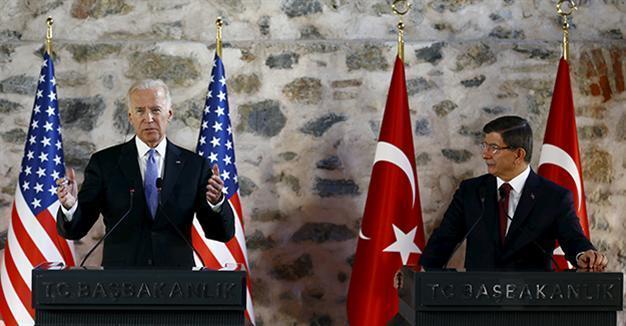US, Turkey agree on Iraq, Syria border, split on PYD
Deniz Zeyrek - ANKARA

U.S. Vice President Joe Biden (L) speaks during a joint news conference with Turkish Prime Minister Ahmet Davutoğlu in Istanbul, Turkey January 23, 2016. REUTERS/Murad Sezer
Turkey and the United States are singing the same tune on a number of key regional issues including a Turkish military camp on Iraqi soil and the total closure of a key stretch of the Turkish border with Syria, but they remain in disagreement over the Democratic Union Party (PYD) in northern Syria, following an official visit by U.S. Vice President Joe Biden to Turkey.Washington recognized the outlawed Kurdistan Workers Party (PKK) in Turkey was as much of a threat to Ankara as the Islamic State of Iraq and the Levant (ISIL), Biden said.
Speaking at a joint press conference with Turkish Prime Minister Ahmet Davutoğlu on Jan. 23, Biden also said the United States and Turkey were prepared for a military solution against ISIL in Syria should the Syrian government and rebels fail to reach a political settlement.
“We know it would be better if we can reach a political solution but we are prepared ..., if that’s not possible, to have a military solution to this operation in taking out Daesh,” Biden, using the pejorative Arabic acronym for ISIL, while a U.S. official later clarified that Biden was talking about a military solution to ISIL, not Syria as a whole.
Biden said he and Davutoğlu also discussed how the two NATO allies could further support Sunni Arab rebel forces fighting to oust President Bashar al-Assad.
For his part, Davutoğlu said Turkey saw three threats in Syria: “One is the regime, another is Daesh, and the third is the YPG [People’s Defense Units, the armed forces of the PYD) in northern Syria].”
Davutoğlu said only the “legitimate Syrian opposition” should be involved with negotiations over Syria.
“Turkey sees no difference between terrorists groups such as Daesh, PKK, DHKP-C [the Revolutionary People’s Liberation Party-Front] or al-Nusra,” said Davutoğlu.
Nonetheless, the United States draws a clear distinction between the PYD, whose fighters it supports, and the PKK in Turkey.
In remarks delivered to local media on the way back from Davos before meeting with Biden, Davutoğlu said Ankara would strike the YPG in northern Syria just like it hits PKK targets in northern Iraq.
Marea-Jarablus line
During meetings between Biden and Turkish officials held in Istanbul, the priority was given to exchange views on ways of sealing the final portion of the Turkish border to ISIL, a 98-kilometer long zone on the so-called “Marea-Jarablus line,” sources said. The military commanders from the two sides will accordingly come together in the coming days in order to detail shape of cooperation for the move.
‘New initiatives’ on Bashiqa on agenda
On Jan. 23, Biden met President Recep Tayyip Erdoğan, but an expected joint statement was not issued. Presidential sources later said Erdoğan re-emphasized that Turkey’s operations in Bashiqa in northern Iraq, where the troops were stationed, were for training local forces there.
He called for serious efforts to clear Iraq of terror – starting with Ramadi and followed by Falujah and Mosul.
Turkey should withdraw any military forces in Iraq that are “not authorized by the Iraqi government,” U.S. President Barack Obama repeatedly told Iraqi Prime Minister Haider al-Abadi during a phone call on Jan. 6.
“There is an agreement on strengthening coordination and proceeding with new initiatives on the Bashiqa camp and the fight against Daesh in Iraq,” an anonymous source from the prime ministry office told reporters after Davutoğlu’s meeting with Biden, without elaborating on the “new initiatives.”
Davutoğlu also said the Turkish military was in Iraq to protect against ISIL, reiterating that Ankara respected Iraq’s territorial unity.
Hürriyet learned from sources that while Biden was here, the Turkish side proposed a project to the U.S. to calm Iraq’s unease. According to the project, which found support from the U.S., U.S., NATO and the anti-ISIL coalition will jointly operate at the training base in Bashiqa. Nonetheless, no logistical change will be made at the base other than a sign showing that an international force is deployed there. The Iraqi army will be allowed to have a representative as part of the international coalition. Military officials are expected to gather in the coming days to implement the project, the same sources said.
No harmony on freedom of speech
Ahead of his talks with Turkish leaders, Biden met members of the ruling Justice and Development Party (AKP), the main opposition Republican People’s Party (CHP) and the Peoples’ Democratic Party (HDP), which is focused on the Kurdish issue, to mainly discuss the Kurdish southeast. He criticized the Turkish state for intimidating the media, curtailing Internet freedom and accusing academics of treason.
On Jan. 23, local media reported that on a flight back from Davos, Davutoğlu told reporters Biden had not spoken with the right people to get a clear picture of what was going on.
In an apparent rebuke, Erdoğan told Biden on Jan. 23 that he expected sensitivity from Turkey’s allies and that they should avoid statements that are tantamount to support for those trying to hamper Turkish efforts to fight terror, presidential sources said.
“When Internet freedom is curtailed and social media sites like YouTube or Twitter are shut down and more than 1,000 academics are accused of treason simply for signing a petition, that’s not the kind of example that needs to be set in the region,” Biden said Jan. 22.
Earlier in January, a collection of university lecturers called the Group of Academics for Peace issued a manifesto calling for end to fighting in southeast Turkey.
The region has witnessed security curfews and several towns have been cut off as the police and military battle the PKK. More than a dozen academics were detained over the petition, which accused the state of violating human rights.
















